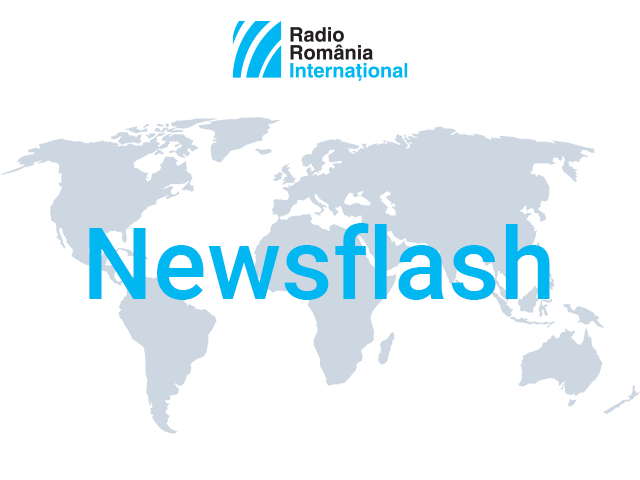February 26, 2022 UPDATE
A roundup of domestic and international news

Newsroom, 26.02.2022, 20:00
WAR IN UKRAINE – Ukraine’s president, Volodymyr Zelensky said Ukraine’s allies continue
to deliver weapons to his country, dismissing false information according to
which he had ordered the army to surrender. President Zelensky said on Saturday
that the Ukrainian army ‘ruined Russia’s plans’ on the third day of the
invasion, and has urged president Putin to put an end to the fighting, AFP
reports. Russian forces on Saturday mounted a new coordinated and artillery
attack on several Ukrainian cities, including the capital-city Kyiv, where
gunfire and explosions were reported in the proximity of Government buildings,
according to eye-witness reports and Ukrainian army officials. Also on Saturday, the Russian army received the order to expand its offensive in Ukraine, the Russian Defense Ministry reports. US president Joe
Biden has signed a decree disbursing 600 USD to Ukraine in assistance. 350
million dollars have been earmarked to purchase ‘defense items and services as
well as military training’. At the same time, the White House has called on
Congress to make available 6.4 billion USD in response to the Russian invasion
of Ukraine, of which 3.5 billion will be earmarked to the Department of
Defense. The USA and the EU imposed sanctions
on the Russian president and the Russian Foreign Minister. Additionally,
NATO announced it will continue to provide weapons to Kyiv and has mobilized its
rapid response force on the Alliance’s eastern flank.
NATO – The Romanian Foreign Ministry on Saturday called on Russia to
immediately cease acts of unprovoked aggression and withdraw its troops and
equipment from Ukraine. In a press release, the Minsitry says that 8 years
since the annexation of Crimea, Russia continues to breach international law.
The Romanian Embassy in Kyiv also suspended its activity, as did the General
Consular Office in Odessa. The entire embassy staff was safely repatriated. Romania’s
consular offices in Chernivtsi and Solotvino are still open. Romania closed
down its airspace to all Russian aircraft, the Romanian civil aviation
authority announced on Saturday. France will relocate 500 of its NATO military
to Romania in response to Russia’s invasion of Ukraine, the French chief of
general staff, Thierry Burkhard has announced. NATO has decided to consolidate
its presence on the eastern flank and send a strong message of strategic
solidarity by deploying forces to Romania, General Burkhard argued, adding that
France’s NATO personnel in Estonia will also be reinforced ahead of schedule.
At the same time, Portugal will also accelerate the deploying of its infantry
to Romania as part of NATO operations originally slated for the second half of
the year. Portugal will also help receive Ukrainian refugees by granting
emergency visas, EFE news agency reports. Prime Minister Antonio Costa told a
press briefing at the end of the NATO summit that this infantry battalion
comprises 174 military and is due to head out to Romania within the next few
weeks.
REFUGEES – In Romania, authorities and civil society are coordinating in order to
assist people fleeing the war in Ukraine.
An online platform was created on the Government website where people
can access support measures and initiatives in real-time. The authorities have
also started building the two refugee camps, one in Sighet, in Maramureș County, and the other in
Siret, Suceava County, both in the north. Some 20,000 refugees from Ukraine have crossed
into Romania since the start of the Russian invasion, mostly women and
children. As hotels and guesthouses are getting overcrowed real fast in the
north and northeast, association of volunteers have offered to put up people,
including in their own homes. People and NGOs have mobilized from the start of
the war and have prepared food, water and hot coffee adn tea for refugees
crossing the border. The Red Cross is on the ground, distributing food and
personal hygiene products together with a large retailer. Lists with essential
phone numbers are distributed to the refugees, whereas volunteers have set up
phone-charging systems and local Wi-Fi networks close to the border. (VP)




























